Supporting the University Strategic Goals
Our team always seeks new technologies to connect and empower the campus community. See how our various projects and services support the seven goals of the Wolfpack 2030: Powering the Extraordinary Strategic Plan and drive digital transformation.
Goal 1: Empower students for a lifetime of success and impact
- Continued the Project Management Lite (PML) Program with 46 interns from the NC State Poole College of Management, the Department of Computer Science, the College of Engineering and the Department of English. In the PML program, students work alongside experienced professionals on real projects to build their strengths, talents and knowledge and foster technological innovation at NC State. Fifteen interns graduated in May 2024.
- Implemented interfaces between the Student Information System (SIS) and Slate Graduate Admissions to allow Slate to serve as an active student-customer relationship management system, providing more effective communications and streamlining student support services.
- Consolidated academic progress reporting within SIS to streamline communication among instructors, students and advisors.
- Developed an automated student internship sign-up and assessment process for the College of Veterinary Medicine using Slate.
- Designed, built and implemented a Transfer Planner to help prospective transfer students envision their paths at NC State with “what if” degree plans that include coursework at other institutions.
- Adapted financial aid awards to support the new FAFSA Simplification Act, which will provide more aid quickly to eligible students in a more efficient manner.
- Ensured technology uptime in ClassTech classrooms to limit interruption to teaching and learning activities. This is critical as pedagogies evolve to use high-tech classroom environments better.
- Supported 322 ClassTech spaces across campus as well as 171 general-purpose classrooms. The chief focus in these spaces is faculty training, incident response and resolution, and technology lifecycle processes. We also provided high-quality support for 130 spaces, including Unity Labs and OIT training and conference rooms, under a service-level agreement.
- Assisted with the Poe Hall closure. Toured several possible replacement classroom spaces, developed quick AV classroom solutions, and priced them. This resulted in the temporary upfitting of Titmus Theater and several spaces in Lampe.
- Serviced more than 4,000 students at the OIT Walk-in Center. Made 422 hardware repairs and provided loaner laptops to 318 students. Surveys indicated that 91% of students were satisfied or very satisfied with the provided service.

Goal 2: Ensure preeminence in research, scholarship, innovation and collaboration
- Worked toward transitioning the Aerial Experimentation and Research Platform for Advanced Wireless (AERPAW) platform to OIT. AERPAW is the first wireless research platform to study the convergence of 5G technology and autonomous drones.
- Implemented the Proposal Tracking and Post Award Management modules within the Research Enterprise Data system to streamline research proposal and award processing. These modules will also provide better data for decision-making and process improvement.
- Continued to maintain compliance with the Defense Federal Acquisition Regulation Supplement (DFARS) 252.204-7012 and the National Institute of Standards and Technology (NIST) 800-171 to use the Department of Defense Federal Contract Information and Controlled Unclassified Information in the Secure University Research Environment (SURE). Continued collaboration with the Office of Research and Innovation to monitor the SURE System Security Plan.
- Provided High-Performance Computing (HPC) resources for computationally intensive research and instruction. OIT is on track for an all-time high number of processor hours during this calendar year.
- Made Research Storage improvements to back up processes to ensure research data is appropriately protected against various risks, including inadvertent deletion and ransomware attacks. Conducted a usability study and worked to implement recommendations to improve the discovery of the Research Storage service and make the portal more user-friendly.
- Provided the North Carolina Plant Sciences Initiative with architectural guidance on IT platforms to support tier-research projects.
- Provided the Data Science Academy with instructions on how to use HPC resources to process large data.
- Completed an assessment of HPC, including service strategy and service-design activities. Delivered a recommendation for the College of Sciences to transition their HPC computing infrastructure to OIT, along with options for OIT to improve service delivery. Also provided a service requirements document with defined service-level objectives for HPC services.
- Provided expertise in data management and security planning to the university’s human-subject researchers.
- Continued to provide subject matter expertise to enhance security for the Rapid Access Biosecurity application, a data-driven tool being developed by NC State.
- Continued to provide project leadership for the Regulated Research Community of Practice.
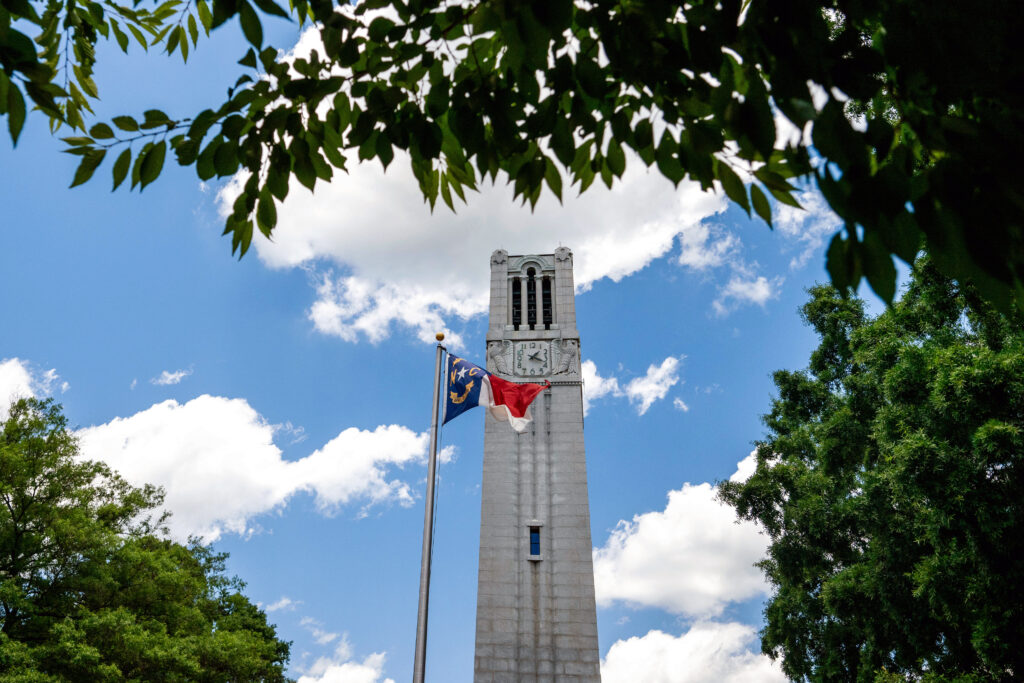
Goal 3: Expand and advance our engagement with and service to North Carolina and beyond, defining the standard for a 21st-century land-grant university
- Partnered with Winston-Salem State University to provide tier 3 support for their campus phone systems.
- Increased Voice over Internet Protocol (VoIP) capacity to 40,000 devices for the North Carolina Department of Information Technology (NC DIT).
- Began a benefit and feasibility analysis with several University of North Carolina (UNC) System institutions interested in implementing NC State’s System of Assessments Guiding Education, a custom-built teaching licensure tracking system.
- Provided Virtual Computing Lab resources and support to state community colleges.
- Continue to provide access to the Jamf Pro Server for the UNC System management of Apple devices. Eighty-two units at eight UNC System schools used the federated Jamf Pro instance to manage 37,888 devices.
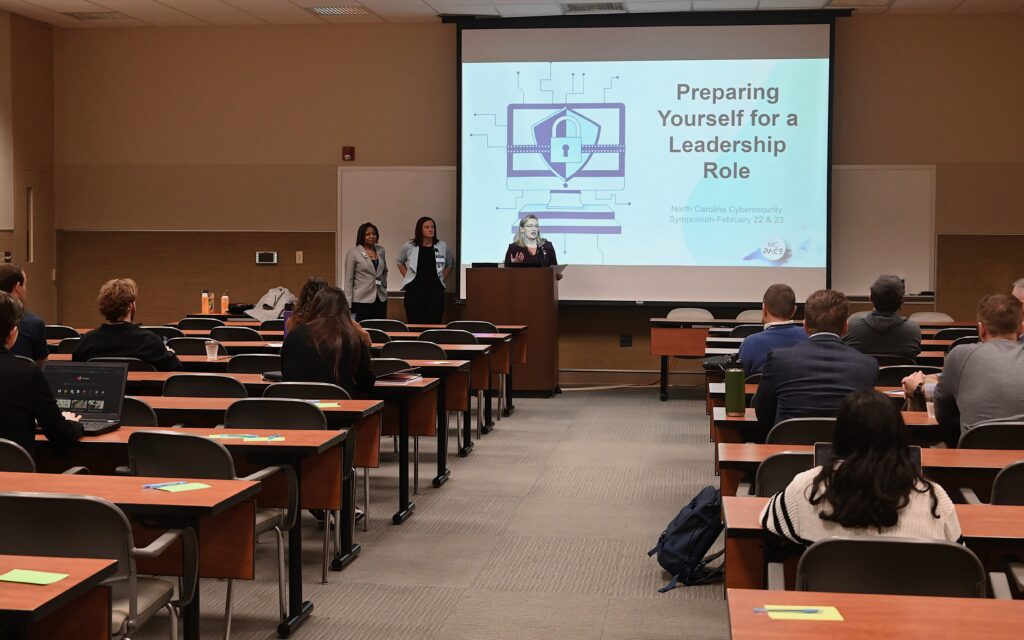
Goal 4: Champion a culture of equity, diversity, inclusion, belonging and well-being in all we do
- Collaborated with the Office of Inclusion, Equity and Diversity to develop “Equity First: The Path to Inclusion and Belonging” workshops. The OIT Diversity, Equity, Inclusion and Belonging team hosted this six-part series to help OIT staff take an active role in creating and maintaining a healthy working environment. In addition, the team held events and provided OIT staff with access to additional resources to broaden their knowledge.
- Hosted the fifth annual IT Community Event to bring campus IT professionals together to network, share ideas and be recognized for their many contributions to campus IT innovations.
- Offered opportunities to strengthen relationships across units, encourage further collaboration and deepen understanding and connections with each other.
- Continued to sponsor and assist in leading the NC State Women in Technology interest group.
- Conducted 199 accessibility reviews of information and communication technology products as part of the IT Purchase Compliance (ITPC) process.
- Assessed 541,005 webpages from 84 campus units using the Pope Tech web accessibility scanning tool.
- Awarded 28 Captioning Grants totaling $56,790 to campus instructors to develop accessible digital multimedia for students.
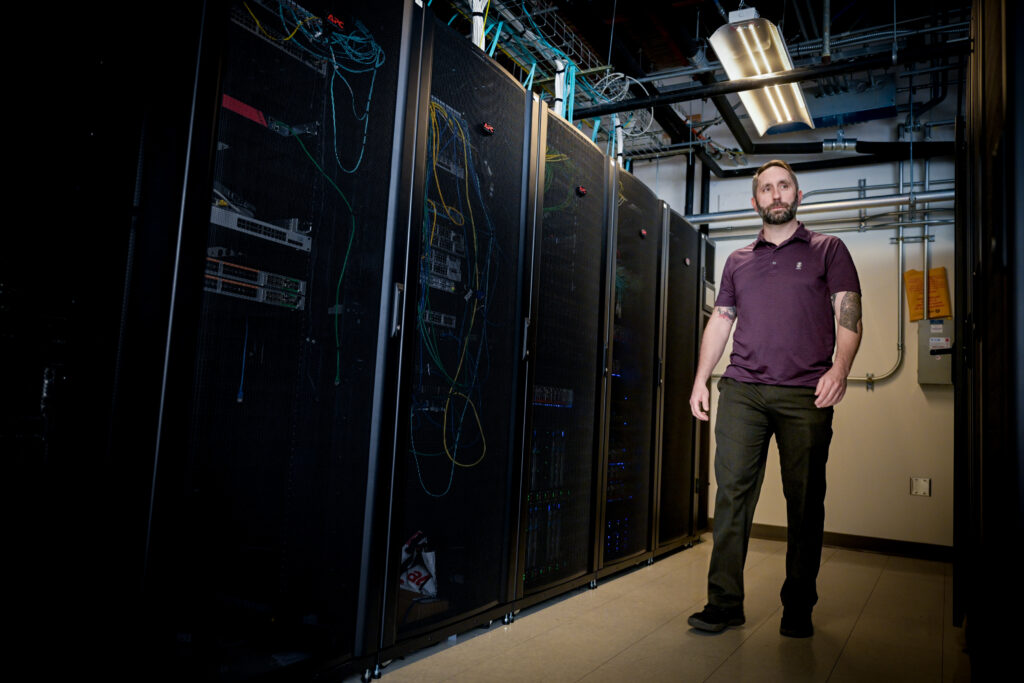
Goal 5: Improve university effectiveness through transformative technologies, cutting-edge processes and actionable data
- Launched the design phase to enhance the Avent Ferry Technology Center (AFTC) for hybrid workspaces, enabling the consolidation of OIT staff in the Hillsborough Building and AFTC into one location.
- Worked on multiple fronts to redesign the OIT website. The new design will display the NC State web design theme and organizational content and offer user experience consistency with the NC State IT Service Portal. Service-related content will be migrated to ServiceNow and several improvements were made to Knowledge and Service Portfolio Management to enable users to find content more efficiently.
- Implemented Google storage reduction initiatives that led to a 40% reduction in storage from 5.2 petabytes (PB) to 3.11 PB. To meet Google’s storage quota by November 2024, the Google Service Team (GST) set quotas for all users across campus in August 2023. The GST and local IT staff continue to work with campus users over quota to reduce unnecessary storage and move archival and research data into more appropriate locations, such as OIT Research Storage. The team also deleted suspended storage owned by former students and employees as well as abandoned or unused shared drives.
- Worked with primary stakeholders to develop a program charter for a Guest and Affiliate system to identify and track university guests and affiliates and manage their access to appropriate IT-based services.
- Partnered with T-Mobile to enhance indoor cellular coverage. A pilot is underway, and the project is expected to be fully deployed within a year.
- Completed the transition of life safety phone lines to VoIP.
- Completed the renovation of the main network hub serving North Campus.
- Completed a new network hub to serve Lake Wheeler Field Labs.
- Supported the build-out of the NC State Gaming and Esports Lab in the James B. Hunt Jr. Library.
- Continued the fourth year of a five-year project to upgrade wireless bandwidth throughout campus.
- Upgraded more than 24,000 network ports across campus to provide faster connectivity.
- Completed the upgrade of the campus network backbone from a 10 gigabits-per-second (Gbps) core to a 100 Gbps core.
- Doubled the Wi-Fi network capacity to 120 Gbs.
- Doubled the ResNet network capacity to 120 Gbs.
- Upgraded the NC State Virtual Private Networking service to the supported Cisco Secure Client.
- Resolved 7,191 Managed Desktop incident tickets. This is the highest ticket count year on record since 2015.
- Configured and deployed 92 new WolfPrint printers.
- Began phase 1 to launch an audio-visual help desk for ClassTech to provide technology support more efficiently and effectively.
- Provided technology and support for university initiatives, including NC State Day of Giving, early voting on campus and the Southern Association of Colleges and Schools Commission on Colleges Accreditation effort.
- Worked with clients to complete the move of OIT Managed Desktop-client virtual local area networks behind the NC State Protected Network, except for one department requiring additional work in July 2024 and those already in flight with dates later than requested.
- Made various ServiceNow improvements including:
- Upgraded the platform from Tokyo to Vancouver. The upgrade included implementing the ServiceNow Agile Teams capability for project management and application development lifecycle management. OIT and the NC State University Libraries use this new feature.
- Improved and utilized knowledge base articles, resulting in 59% of incidents being answered with existing articles.
- Improved the quality of system-generated notifications for customers and end users.
- Collaborated with the College of Sciences to design and deploy an IT service portal, Incident Management, Knowledge Management, surveys and request fulfillment capabilities.
- Collaborated with help desk managers to improve the User Lookup feature, user alias data and the Service Operations Workspace, which displays all work deliverables.
- Collaborated with Digital Education and Learning Technology Applications (DELTA) Innovative Learning Spaces and Support to align support processes to IT Service Management standards.
- Collaborated with Poole College of Management Business Operations to improve customer support surveys and related reports.
- Improved Knowledge Management and Service Portfolio Management capabilities as a predecessor to the OIT website redesign project.
- Designed and deployed automated processes for Configuration Item owners to complete data classification in bulk.
- Relaunched the ServiceNow Mobile Application for Agents with basic capabilities. More work is required to enable users further, especially those dispatched to various locations.
- Used classroom monitoring tools to detect technology issues before impacting scheduled classes.
- Began a project to fully support enterprise services with Amazon Web Services.
- Implemented Oracle’s Data Guard for all production enterprise application databases to significantly reduce the time required to recover the Financial System, the Human Resources (HR) System and the SIS in the event of a disaster.
- Partnered with Institutional Strategy and Analysis and campus central offices to assess Microsoft’s Power BI and Salesforce’s Tableau capabilities to serve as a potential enterprise analytics platform.
- Migrated from Report2Web platform to OnBase for report distribution, resulting in yearly cost savings of $75,000.
- Partnered with Environmental Health and Safety’s Fire and Life Safety team to migrate from a paper-based process to OnBase, which provides a simple, automated and secure means to collect, store and report on sensitive campus emergency event data.
- Processed the following OnBase Unity Electronic Forms (replacing paper versions, emails and phone calls) to support business process automation for employees and students:
- 167 Employee Emergency Loan Request submissions
- 42 Student Health Integrated Care Referral Request submissions
- 1,646 Poole College of Management Student Major & Concentration Declaration form submissions
- 21 Workers’ Compensation settlement, rating and payment forms
- 20,564 Student Financial Aid Student Verification Worksheet submissions
- 246 new and 2,464 legacy Fire and Life Safety Medical Event Information forms
- 842,490 HR, Payroll, Compensating Control OnBase reports
- Completed the bulk of the design and development work to migrate from an antiquated System Access Request (SAR) application to a modern platform with a more intuitive user interface and streamlined approval processing. SAR is used to request and approve requests for access in many administrative systems.
- Enhanced processes within the Financial System, such as the Mobile Communication Device request process and the trust budget management process to eliminate manual effort and streamline processing.
- Deployed the Wolfpack Performance Program in the HR System to provide fully electronic work plan and performance management.
- Implemented a self-service process to purchase additional NC State Drive storage quota through ServiceNow.
- Completed a successful pilot of ServiceNow Event Management, showing potential for increased visibility into IT service operations and faster response to production issues.
- Onboarded the College of Engineering, the College of Humanities and Social Sciences, the College of Education and the NC State Continuing and Lifelong Education into the Web Publishing environment. Saw a nearly 30% growth in the number of websites. Merged support queues with University Communications to provide a single interface for support and now run shared biweekly office hours. Migrated the storage environment from the Internet Small Computer Systems Interface to the Network File System version 4.2 and helped the campus through the Universal to Google Analytics 4 migration.
- Completed a rewrite of the campus directory application, removing a significant amount of ancient code and making the HR and Student systems the only source of campus directory information
- Deployed a Kubernetes environment to run Oracle Identity Manager and other applications.
- Developed tools, including the NC State Drive Inventory plugin, to provide data to Google Workspace users and campus IT staff in response to the upcoming Google storage quotas.
- Collaborating with the University Controller’s Office, attested 100% compliant with the Payment Card Industry Data Security Standard (PCI DSS) in March for the sixth consecutive year. The University Dining merchant chain continues to attest as a Level 2 merchant. The university takes credit cards at 90 locations, yielding 1.65 million transactions totaling approximately $128 million annually.
- Collaborated with the University Controller’s Office, University Human Resources (UHR) and campuswide data stewards to more securely restrict the use of sensitive data by “unpaid appointment” accounts. Controller’s Office approval is now required for “unpaid appointment” account access to the Financial System beyond self-service.
- Upgraded to Duo Advantage to provide enhanced protection for end users.
- Disabled Unity credentials for 782 user accounts due to various security concerns and compromises.
- Revamped the Vendor Risk and License Management (VRLM) website to improve user experience, resulting in significantly fewer license requests through ServiceNow.
- Managed software licenses and maintenance contracts totaling $20.3 million in addition to the $1 million SAS grant. Managed licensing partnerships with colleges and departments totaling $1.7 million.
- Purchased $929,028 of new software and services to support the university mission while terminating $677,672 of phased-out software, resulting in a net increase of $251,356 for OIT licensing.
- Continued to enhance the ITPC process. Reviewed all IT purchases involving purple data, artificial intelligence, data related to the Health Insurance Portability and Accountability Act (HIPAA), PCI DSS data and purchases, regardless of cost, that were subject to export control regulations. Also reviewed all IT purchases with a cost of $5,000 or more.
- Completed a Gramm-Leach-Bliley Act (GLBA) risk assessment, including risk scores, risk statements and the work with risk owners Office of Scholarship and Financial Aid and University Cashier’s Office to determine risk treatment plans.
- Worked extensively with the UNC System Office to explore alternatives to ServiceNow for vendor risk management.
- Reported a decrease in public record, litigation hold and eDiscovery requests from 42 to 14.
- Updated and prioritized the NC State Cybersecurity Strategic Plan, recommending projects and resource requirements to secure university data and information systems and achieve compliance with universitywide rules, regulations, laws and standards.
- Held a successful 2023 National Cybersecurity Awareness Month (NCSAM) campaign in collaboration with Cybersecurity Awareness Team (CSAT) members and campus partners. The theme, “Tidy Up Your Digital Tracks,” focused on encouraging students, faculty and staff to review and change how they use and store data at NC State and at home.
- Updated the mandatory Data Security Training module in REPORTER to address the current threat landscape. This included a pilot test to identify any issues before launch. As of May 2024, the CSAT reported a 91.5% compliance rate of more than 25,000 employees and affiliates. CSAT continues to explore ways to increase the compliance rate. Collaborated with UHR to ensure “unpaid appointment” account holders completed the DST. Those who did not complete the training were already separated from the university. Completed two pilots with KnowBe4 to test the feasibility of using a commercial product for cybersecurity and phishing awareness.
- Updated contractual obligations, including but not limited to the International Organization for Standardization-27002, PCI DSS, DFARS, NIST 800 series, GLBA and HIPAA. Employed the IT risk management process to determine priorities.
- Began the Documentation Library and Catalog Service pilot to formalize project intake for OIT technical documentation development.
- Continued to update IT policies, regulations and rules to include:
- Published POL 08.00.01 – Use of IT Resources Policy that was approved by the Board of Trustees in April.
- Continued to revise REG 08.00.02 – Use of IT Resources Regulation.
- Continued to revise REG 07.70.01 – Identity Theft Prevention Program.
- Continued development of a new Identification and Authentication Standard and supplemental guidance to replace the outdated Password Standard webpage.
- Continued to implement the Configuration Management Database, an inventory of data across all campus IT resources that supports data classifications by level of sensitivity.
- Began an initiative to define a baseline of campuswide security controls to set minimum security expectations for each university data sensitivity classification level.
- Updated the Information Security and Privacy Acknowledgement Form to replace the Student and Employee Records fields with a reference to the Data Management Framework website.
- Partnered with UNC-Chapel Hill and Duke University to participate in a Cyber Bowl, a new NCSAM initiative that will be held in October 2024.
- Partnered with Chancellor Randy Woodson to record a three-minute video warning campus users about the dangers of phishing.
- Deployed CrowdStrike to 2,000 defined high-profile users.
- Conducted an updated gap analysis to meet NIST 800-171 compliance for PeopleSoft SIS.
- Developed a Major Incident Process to handle major and critical incidents and issues. The new process focuses on transparency, communication and comprehensive reporting.
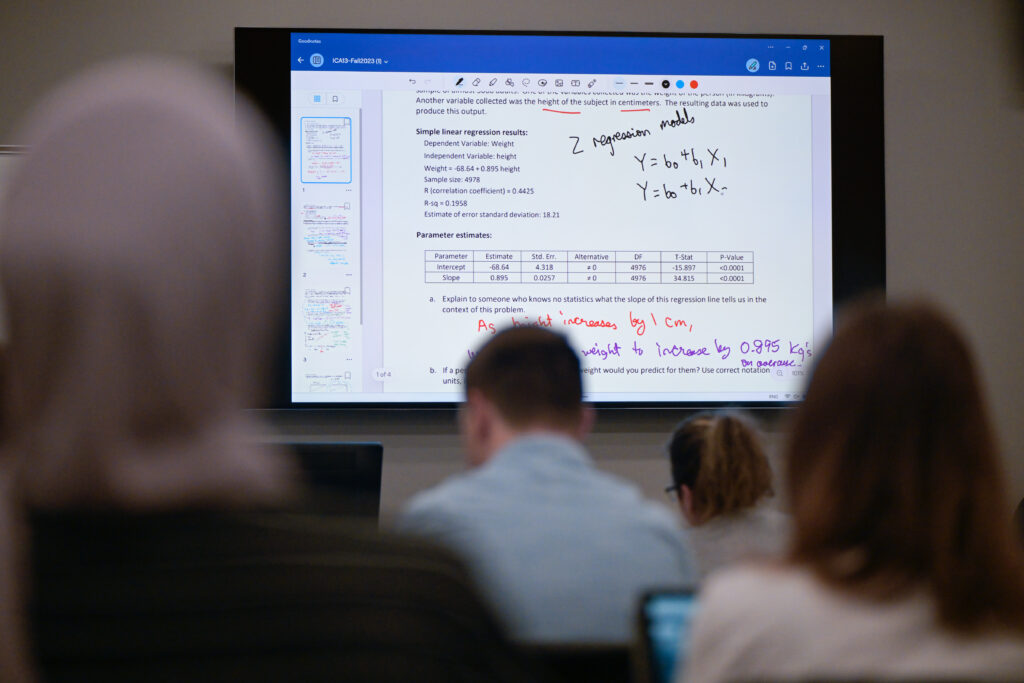
Goal 6: Lead in developing innovative partnerships, entrepreneurial thinking and applied problem-solving
- Continued the partnership between ClassTech and DELTA to enable the successful delivery of the capture service.
- Participated in the Classroom Technology Working Group, enabling the exchange of information and ideas that impact all colleges and the development of cross-campus relationships.
- Provided ongoing leadership and support for UNC CAUSE, the IT organization that promotes and facilitates cooperation, information exchange and shared technology use among UNC System campuses.
- Continued the partnership with NC DIT and three UNC System universities to provide phone system support.
- Participated on the Google Higher Education Advisory Board and the NET+ Google Workspace for Education Service Advisory Board to collaborate with other universities, business partners and Google to provide the best resources to Google Workspace users.
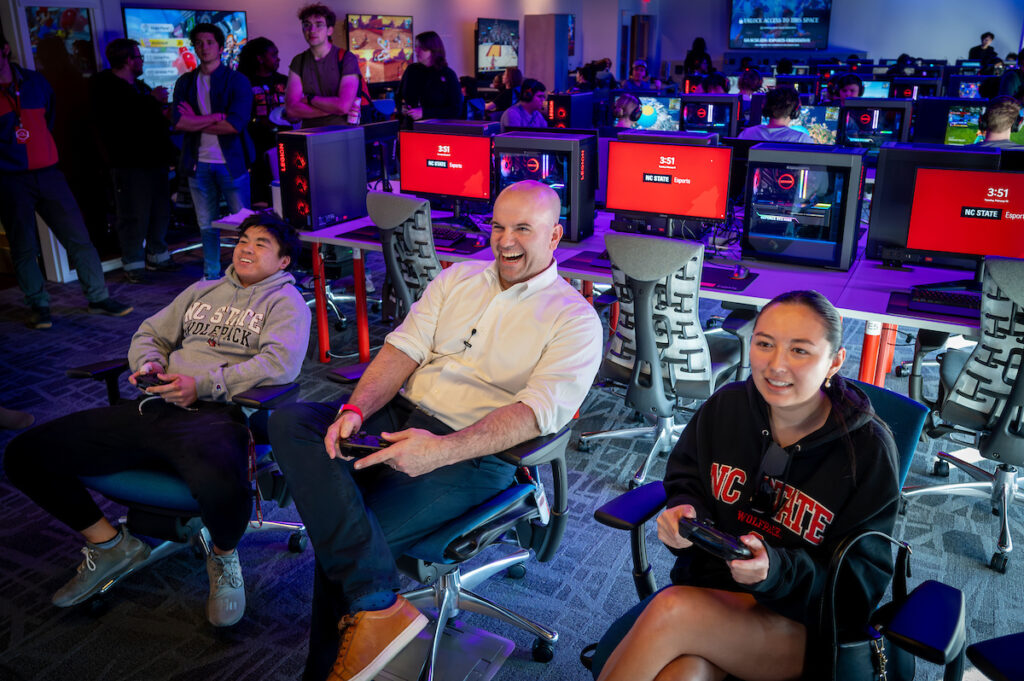
Goal 7: Elevate the national and global reputation and visibility of NC State
- Helped lead esports initiatives with the NC State University Libraries. Initiatives include building an esports arena in Mann Hall, creating a mobile esports arena and the NC State Gaming and Esports Lab, and hiring an esports director.
- Released a report detailing the review of campus research computing and storage by four directors from peer universities.
- Explored a partnership with the U.S. Department of Agriculture (USDA) to provide research computing services to support their Agriculture Research Services (ARS).
- Continued to work with the USDA ARS to host a supercomputer node for SciNet.
- Continued involvement with EDUCAUSE, the Southeastern Universities Research Association, the UNC System and other educational IT organizations to improve higher education partnerships.
- Participated on the planning committee for the Smart Cities Connect Spring Conference hosted by the city of Raleigh to redefine the future of urban spaces.
- Served as project chair and contributed to the Apache VCL open-source project, which provides scheduling and provisioning of remote access to high-end computational resources.
- Continued membership in the Multi-State Information Sharing and Analysis Center, Higher Education Information Security Council, and the Research and Education Networks Information Sharing and Analysis Center.